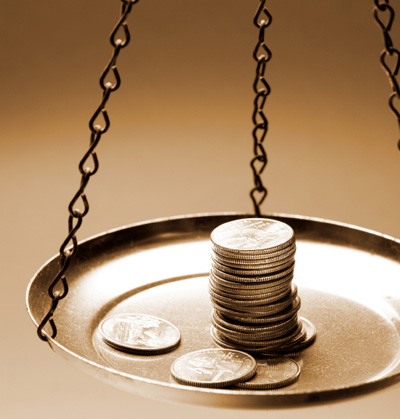Your portfolio looks wilted. Your home’s value is seeping through the basement floor. Perhaps your income has been battered, too. All together, your personal wealth, thanks to a few economic factors beyond your control, has taken a wallop. You feel frustrated, sad, maybe a bit angry. Take heart that you aren’t alone, and that if you are like the vast majority of Americans, you still have a very long way to go before you hit poverty. Chances are good that you have plenty to eat, warm clothes for the winter months, a roof over your head, and adequate medical care. So why are you feeling so glum?
According to Sonja Lyubomirsky, Ph.D., professor of psychology at the University of California, Riverside and author of The How of Happiness: A New Approach to Getting the Life You Want, happiness, in the long run, provided you are not living in poverty, really does not depend on how rich you are. Numerous studies, she says, make that point rather conclusively. (Happiness, as we’ll see in a minute, is much more about relationships and attitudes.) But in the short run, things can be very different. We become accustomed to a certain level of material wealth. Should that level adjust either up or down, our mood is likely to swing with it. And that, according to Dr. Lyubomirsky, is why you are feeling blue.
What to do about it? There are several options. You can wait until you naturally adjust to your new level of wealth (whatever that is); wait until the economy starts cranking again and your nest egg makes a welcome comeback; or you can follow these tips to lift your spirits, regardless of which way the economic winds may blow.
Buy experiences.
“Spending your limited money on experiences, things that help us make connections — time with friends, a French class, traveling with family — tends to have a much larger impact on happiness than spending money on mere material possessions, such as dining room furniture or new kitchen cupboards,” says Dr. Lyubomirsky.
Forget about status symbols.
Advertisers spend billions to drive us toward one particular brand or another. But spending your money, especially in hard times such as these, on expensive, trendy products (handbags, perfumes, or mineral water in fancy, odd-shaped bottles) is money down the drain as far as adding to your happiness, says Dr. Lyubomirsky. “These brand allegiances do nothing to enhance your well-being.”
Separate needs from wants.
“Many advertisers count on the fact that we don’t reflect. Becoming mindful — taking time to think about whether or not we really need something — can go a long way toward having a better life,” says Tal Ben-Shahar, Ph.D., author of The Pursuit of Perfect: How to Stop Chasing Perfection and Start Living a Richer, Happier Life. “We are vulnerable to advertising when we’re mindless. That’s when we don’t notice its effects. Even worse, we don’t notice the wonderful (often free) things in our lives; we do not stop to savor.”
Love what you have.
“Happiness is not a function of what we have, but rather a function of what we appreciate. Studies show that people who regularly express and experience genuine gratitude for what they have — family, a meal, work, wealth — are happier, healthier, and more successful in the long run,” says Dr. Ben-Shahar. He suggests that you might want to keep a journal in which you take daily written notes of all that you are most grateful for.
Reset your goals and ambitions.
“Your happiness is not about high versus low expectations, but about right versus wrong expectations,” says Dr. Ben-Shahar. “If we expect additional income or wealth (assuming our basic needs are already met), accolades, or the attainment of certain goals to make us happier, then we have wrong expectations. These things do not contribute to our well-being other than in the form of a temporary high,” he says. “If, however, we expect that spending quality time with those we care about, acting kindly, and expressing gratitude regularly will make us happier, then we have the right expectations, and we are likely to achieve happiness.” And that’s true, he says, regardless of whether the economy is cruising or sputtering.
Russell Wild, MBA, is a NAPFA-registered financial advisor who has written nearly two dozen books on finance, including Index Investing for Dummies.
Become a Saturday Evening Post member and enjoy unlimited access. Subscribe now




Comments
I am a disabled homemaker and I just remarried after 12yrs as a widow. I found the artilce All I need to know about investing I learned on the farm. It is a real eye opener for me since I don’t understand investments. my new husband has tried to help me learn about IRA’s what ever, it has not helped but I loved this article it really got me to think and understand things. If my husband was to pass away I understand the importantacen of keeping the investments. especially the one # 5 save for a rainy day now this is awesome. since I almost lost my house 10 yrs ago when I became disabled and no income. but with a little God’s help I planned it out. I can do without cable a luxury, electrity. I used candles read more and played board games with my daughter now that is a lost art in keeping a family closed knited. and I found out if they turned off the gas there is always some kind of kindling or briquttes. lots of fun cooking outside and actually taking to each. and cooling off with the water sprinklers when the lawn was being water. this is a great! article found it at the doctor’s office!:). thanks for the great! info. this would never hurt as a repeat!
Sincerely
yours
Porfiria Sosa Mayfield
The Bible has been telling us to keep our eye simple, live simply, etc for thousands of years. Too bad we haven’t listened. This article really helps you to think about what really matters!
If only more Americans who are now deep in credit card debt had differentiated NEED from WANT…………